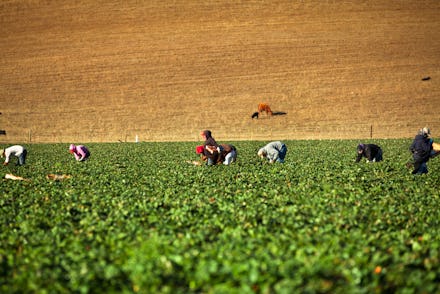Migrant farm workers might see a pay cut even though they're "essential"

It's widely acknowledged that the frontline and essential workers keeping the country running include not just nurses and doctors, but grocery store clerks, farm workers, and mutual aid volunteers. Calling these workers "essential" isn't just a way of expressing appreciation, but rather is an official designation that offers these individuals greater protections, benefits, and pay. Yet it's looking like that might be about to change: It was announced this week that the Trump administration is working with the Department of Agriculture to lower wages for migrant farmworkers.
The discussion is ongoing between Secretary of Agriculture Sonny Perdue and White House Chief of Staff Mark Meadows, NPR reported, and is an attempt to help farm owners who are struggling amidst the coronavirus outbreak. The federal government sets the pay standards for "guest" or migrant farm workers, but advocates say that lowering their wages for the sake of saving farm owners money lets the most vulnerable workers fall through the cracks. Rather than grouping those workers under the "essential" label because they are instrumental in the nation's food production, it makes the status conditional on what kind of visa a farm worker has, activists say.
Of the 2.5 million farmworkers employed in the United States, about 10% have what's called an H-2A visa, which permits temporary work in the U.S. These visas typically apply to migrant farmworkers who work for poverty wages and live in overcrowded, shared housing. While temporary workers receive health insurance coverage through the Affordable Care Act, navigating and accessing care presents a number of hurdles, such as language barriers or the labyrinthine intricacies with the U.S. health care system. Farmworkers labor for sometimes 10-hour days in 90- to 100-degree heat — and in a pandemic, they're still working to feed the country.
"They’re essential enough to bring here, but not essential enough to protect," Mary Bauer, general counsel for Centro de los Derechos del Migrante (CDM), said to a local ABC affiliate in California of the government's treatment of migrant workers.
"If farmworkers fall sick, what happens to our food supply in the process?"
The Department of Agriculture wants to help farmers stay solvent during the coronavirus outbreak, which has already proved disastrous for food supply chains with farmers having to dump milk and let food rot in the field because they can't get their products to grocery stores. But by lowering wages for migrant workers, the government is undercutting efforts made earlier this month that categorized farmworkers as essential, immigrant rights' activists argue, and jeopardizing the health and wellbeing of migrant farm workers.
"Farmworkers are at the heart of the U.S. food chain. Political leaders and employers must take the appropriate measures to protect farmworkers," Meena Harris and Mónica Ramírez wrote for Fortune. "If farmworkers fall sick, what happens to our food supply in the process?"
The discussion between Meadows and Perdue to lower wages for migrant farm workers may actually harm farmers in the long run, too. There's ample evidence that in the U.S., lower wages correlate with a lower quality of life. Workers who labor in the sun for sometimes more than 60 hours per week at $10 or less per hour likely won't be able to cover all of their living expenses, and many workers arrive in the U.S. with debt. Moreover, temporary or migrant farmworkers are already working without proper access to sanitation or hand-washing stations and or working in close proximity, which means that there's a higher chance that coronavirus could be transmitted between them.
Even immigration hardliners aren't thrilled with the idea, NPR noted. They reason that depressing farm worker wages will cheapen the value of the labor and invite more foreign workers, hurting domestic workers at a time of skyrocketing unemployment. "You know, H-2A program is a cheap labor program anyway. This is to make it a cheaper labor program," said Mark Krikorian, the executive director of the Center for Immigration Studies.
The reality is that if you're living in the U.S. on a H-2A visa, it's not likely there are other employers who are able to offer you work right now. The U.S. has also halted the immigration interviews that are routine in H-2A applications anyway.
Then consider the fact that we'll likely see a downturn in farm work this summer due to the pandemic. All of these factors coalesce into a reality where, even if the White House conspires to slash their wages, farm workers lucky enough to have a paying job at all will likely be in no place to negotiate.